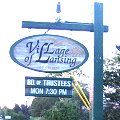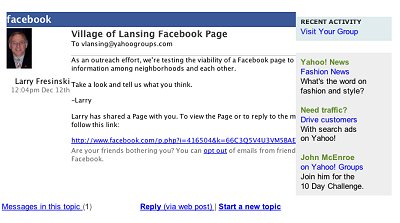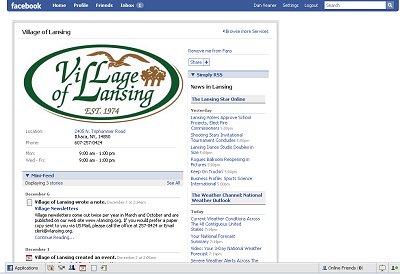- By Dan Veaner
- News
 Print
Print  With more and more people looking to the Internet for information both the Town and Village of Lansing have been using it to disseminate information to its residents. Both update their Web sites regularly, and both have switched from paper newsletters to electronic versions. With mixed results Village Deputy Mayor Larry Fresinski took the idea a step further this month when he created a Village of Lansing Facebook page.
With more and more people looking to the Internet for information both the Town and Village of Lansing have been using it to disseminate information to its residents. Both update their Web sites regularly, and both have switched from paper newsletters to electronic versions. With mixed results Village Deputy Mayor Larry Fresinski took the idea a step further this month when he created a Village of Lansing Facebook page."This is an experiment to see if we can reach people where they are as opposed to where we are," he says. "Obviously we are not very successful at bringing people in."
Fresinski maintains the Village Web site, which has had less than 3,700 visits so far this year. To put this in perspective, the Village population is about 3,400. He has also been running a Village mailing list, which he hoped residents would use to communicate with each other on top of the informational communiqués he sends via the list. But aside from a very occasional lost dog notice, few have used it. 219 people have signed up to receive e-mail from the list.
At the end of November Fresinski set up a Facebook page, and on December 12 he announced to the e-mail list that it is open to the public. "As an outreach effort, we're testing the viability of a Facebook page to share information among neighborhoods and each other," he wrote.

This Yahoo Newsgroup mailing told Village residents about
the new municipal Facebook page
Facebook was founded by former Harvard student Mark Zuckerberg in 2004, and it soon spread to Stanford and yale where it was also widely used. Originally only college students were welcome, but it was eventually opened to everyone, and there are surprising numbers of people of all ages using the site. Today over 140 million people use the site regularly to keep in casual touch with friends and family, with college students making up less than half of that number.
The site gets more than 700 million photo uploads, 4 million videos, and 15 million pieces of content posted each month. More than 660,000 third party developers from over 180 countries have leaped onto the Facebook bandwagon, creating more than 52,000 applications for the platform.
That doesn't necessarily mean residents will use it to share information within the Village. But Fresinski hopes that the interface, with its simple technique for broadcasting short bursts of information to lists of 'friends' will provide a way to get information from the Village government to residents, and vice versa.
"It's an experiment how far we should spread this concept," he says. "It's not clear to me that residents will embrace this idea any more than they are embracing an e-mail list. We have a fraction of our residents on that list, and some are ready to get off at any point there's information that they don't need."

The Village of Lansing Facebook page provides updates on
Village activities
That may be why Facebook could succeed where the e-mail list has failed. Information is entered in a sentence or two, then posted on the 'wall' of people who have connected to the page. They can click on a message to go to the page itself and see more information. Fresinski has uploaded pictures of the Village Trustees and linked them to their Lansing Star interviews, as well as posting timely information on the wall.
Going to an electronic newsletter has been a mixed bag. Residents were sent a postcard saying that it would be available via a link on the Village Web site, but they could call the Village clerk if they wanted to continue to get a paper version. Relatively few responded, raising the question of how many residents read part or any of the newsletter when everybody got it by postal mail. Village officials say there is some evidence it was being read, though they suspect the only information residents were interested in was about brush pickup days.
"I think a lot of people get that newsletter and they rip out the page that has the leaf pickup dates and they put it up on their refrigerator," says Village Attorney David Dubow. "And there it is so you remember three weeks later."
Village Clerk Jodi Dake concurs. "If that's all they care about we can send them a post card that tells when leaf pickup is," she says.
There is little evidence that residents read the newsletter in electronic form. "We routinely had comments from people when we had the paper newsletter," notes Mayor Donald Hartill. "I have not received any comments from the electronic version."
Fresinski says that no matter how people got the newsletter they would ask him to send him information they could have gotten from it anyway. "When we had both versions, after the newsletter went out people would ask when is brush pickup and what are the details?" he says. "I'd go to the online version, copy and paste and send it to them. Yet they had had two opportunities to read it, electronic and paper. It's just that they wanted that piece of information."
He hopes Facebook is an answer, and notes that the department he works in at Cornell has been virtually forced to try the venue. "Somebody's going to win," he says. "They all can't win because it would separate the information too much. Facebook has won as far as universities are concerned. We just cannot recreate the environment. We know we are capturing graduate student levels at age 30. We are getting older folks involved because the others are."
"It's a phenomenon that you can not ignore, and it is transcending all age groups at different levels of impact," Fresinski says. "At the lower end of the spectrum -- younger students and people -- that's the default for communication. At the younger level if you write an e-mail -- that's a formal communication. They stay away from formal communication."
If he is right, this informal way of communicating may become the primary formal way the Village of Lansing communicates.
----
v4i48



